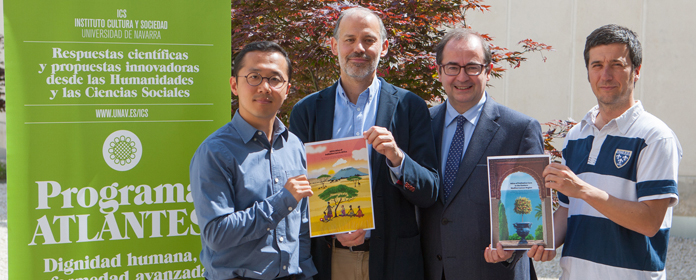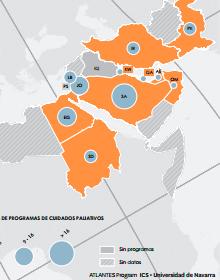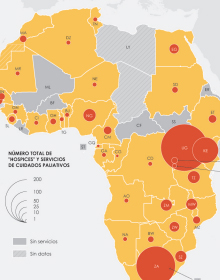The status of palliative care in Africa and in the Arab countries of the Eastern Mediterranean, analyzed for the first time in two publications
Promoted by the University's Institute for Culture and Society , they include data from 48 African and 15 Mediterranean countries.

PHOTO: Manuel Castells
Two new publications analyze and show the currentstatus of palliative care in Africa and in the Arab countries of the Eastern Mediterranean. A total of 48 African and 15 Mediterranean countries are studied. The work is under the scientific direction of the ATLANTES Program of the Institute for Culture and Society (ICS) of the University of Navarra.
"It had been ten years since the global status palliative care in Africa had been reviewed and a similar study had never been done in the Eastern Mediterranean," says Carlos Centeno, researcher principal of the ATLANTES Program and director of the Palliative Medicine Unit of the Clínica Universidad de Navarra.
issue The Atlas of Africa reveals that the total number of palliative care services on the African continent is lower than in the United Kingdom, although the population of the United Kingdom is ten times greater. Nineteen percent of the African countries analyzed have no identified services and 71% of those identified are concentrated in Uganda, South Africa and Kenya.
In the case of the Eastern Mediterranean region, palliative care services in 15 countries account for just over a third of the total in Spain, despite the fact that the population of this region is twelve times greater than that of Spain. Moreover, almost half of the services identified are in Saudi Arabia, although they have developed significantly in Lebanon and Jordan. There are still countries with no - or almost no - specialized services in this area area.
A striking fact in the two atlases is that in both regions patients die in pain because of the limited employment of drugs to combat it. In Africa, 1 milligram of medication is used per capita per year and in the Eastern Mediterranean, 4.5 milligrams per capita per year. These figures contrast with those of Europe, where the average use is 120 milligrams per person per year.
On the development of palliative care in Africa, it is worth noting that it has grown from the work and dedication of local pioneers, almost always starting outside the fragile health care system.
The researcher Carlos Centeno, of the University of Navarra, points out that on the continent "it could be said that the nursing professional is essential in palliative care. Many times they offer not only physical care, but also support and committee in situations of anxiety and depression, and spiritual support and committee when necessary". He also adds that "the community is the heart of African culture" and this fact, together with the need for other professionals to collaborate, has led to the development of a particular figure, the community health workers.
"They have elementary health training and assist the nursing professional as a person of link. They are in direct contact with those who care for the sick, help in the supply of medicines, report changes in the status of the patients and have specific obligations in terms of hygiene or cleanliness and food". Dr. Centeno emphasizes that they often perform these tasks on a voluntary basis, without receiving a salary or only in exchange for the local palliative team's means of transport, such as a bicycle or a motorcycle.
AIDS funding has also boosted this specialization program in Africa. Palliative care became a critical part of AIDS care in several African nations, given the limited treatment options and high patient mortality. However, with the decrease in HIV funding, palliative care has also been reduced and many programs are at risk.
In the case of the Eastern Mediterranean, palliative care began as a medical service mainly for cancer patients, often emerging from pre-existing pain units. At present they have not spread beyond cancer.
Palliative care services in this geographical area are mostly provided in hospital facilities, either as outpatient consultations or as hospital support teams providing consultations to other specialists. There are also to a lesser extent home care teams and very few care centers.
Dr. Centeno is sample hopeful about the future: "Little by little, future doctors and nurses in these regions are receiving training in palliative care. Universities are also waking up to the need to extend palliative care. Half of the African countries and a third of the Eastern Mediterranean nations have at least one university center where it is taught".
Identify strengths and areas for improvementBoth publications, which are supported by Banco Santander, join the collection of atlases that analyze the status of palliative care in the different regions of the world promoted by the University of Navarra. In 2012, the atlas for Europe was presented, and in 2013, the one for Latin America.
Dr. Centeno emphasizes that "governments and organizations, such as WHO, need these and other data to make or guide decisions. These programs of study highlight contrasts with other regions. They also serve to identify strengths or point out the areas -medicines, Education, policies... in which work needs to be done in each country".
The 'Atlas of Africa' is a joint project of the association African Palliative Care (APCA), the high school Arnhold of Global Health of the School of ICAHN Medicine at Mount Sinai Hospital in New York, the association International Association for Palliative Care (IAHPC) and the ATLANTES Program of the University of Navarra.
The 'Atlas of the Eastern Mediterranean Region' is a joint project of the Lebanese Center for Palliative Care-Balsam and the ATLANTES Program of the University of Navarra, with the support of the World Health Organization (WHO) and the association International Association for Palliative Care (IAHPC).


